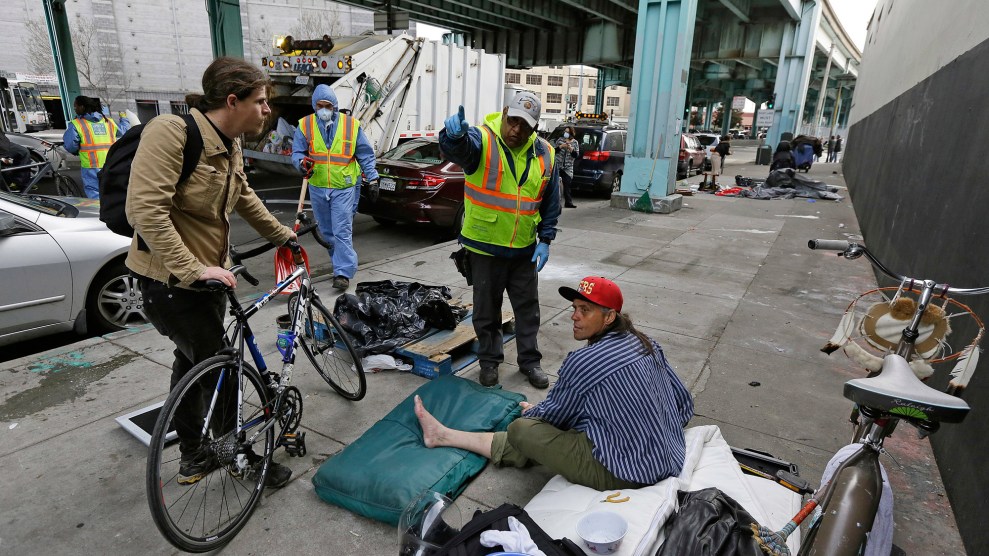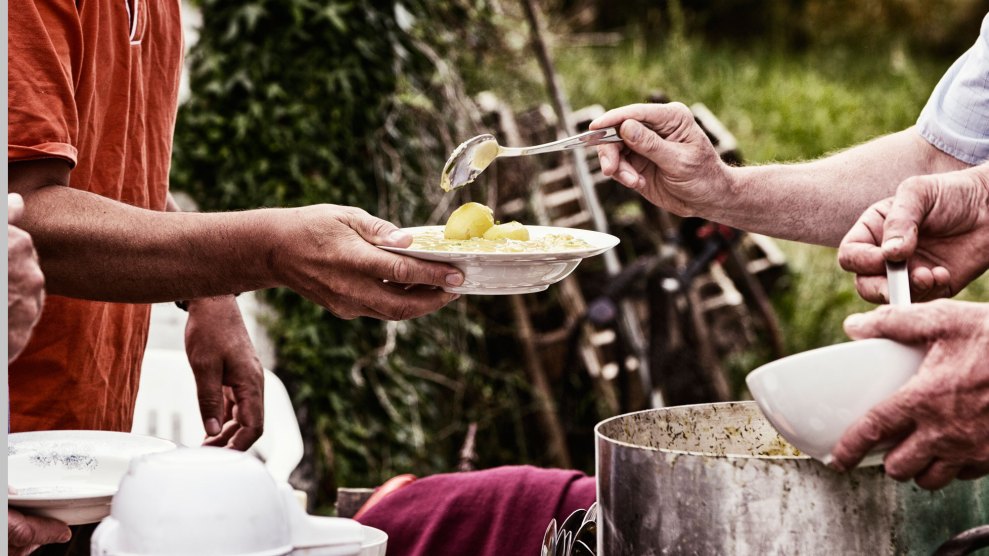
<a href=http://www.istockphoto.com/photo/soup-serving-kitchen-gm475519738-66038575?st=_p_homeless%20food>danefromspain</a>/iStock
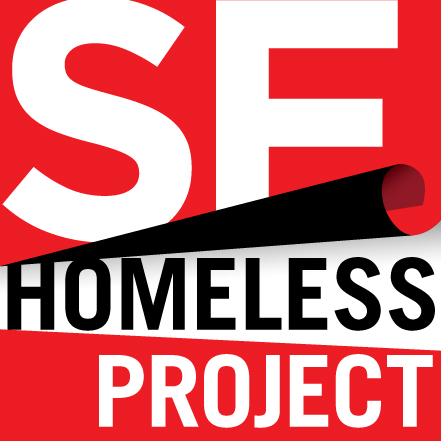
The sun reaches down between the steel slats of a park bridge, its light flickering as a bicyclist glides overhead. Donna Ewing, 54, and her boyfriend, Louie, 52, watch him pass from below. They spent nearly a month digging out a space under the bridge, before adding walls made of plywood and sheet metal. Their new space is an upgrade from the tent they were living in before: It has a sturdy roof and much more privacy.
Donna and Louie have lived in Union Point, a small park near a boat marina in West Oakland, California, for about a year. They’re two of the city’s estimated 6,200 homeless residents, and part of the nearly 17 percent of Americans who don’t have enough to eat on a regular basis. Because of their makeshift living quarters, finding food and preparing the next meal can take up a significant part of the day.
On a Wednesday morning in early December, Louie pushes aside the pink tent he’s hung up in lieu of a front door and hops on his bike for a morning ride. While he’s gone, Donna eats a packaged donut and a few bites of cinnamon toast—the remnants of a bag of groceries Louie brought home from a food pantry a few days before. Donna turns on a hot plate to heat water for coffee, powered by a car battery, the couple’s primary power source. Then she spends the morning cleaning up camp, even though she says she knows she should rest. Her blood pressure is high and she’s in between chemo treatments. When Louie returns, he eats some oatmeal out of a paper cup, along with his favorite toppings—”lots of butter and lots of sugar.”
Some days, Louie rides his bike to a Presbyterian church nearby to collect bagged lunches that are handed out a few times a week. Other days he rides 25 minutes to the Alameda County Food Bank for some groceries. Finding healthy options nearby isn’t easy. Donna and Louie’s setup, like many homeless camps, is near an industrial park just off the freeway, an area seen as a food desert. There’s a McDonald’s and Domino’s Pizza more than a few blocks away, and a FoodMax a bit farther, where Louie can find staples like chicken, coffee, oatmeal, and vegetables. Feeding America, a hunger relief organization, estimates that more than 232,000 people in Alameda County don’t have access to enough nutritious and affordable food. The Alameda County Food Bank feeds about 116,000 people each month.
The homeless are by no means the only population struggling to put dinner on the table: Last year, more than 42 million Americans reported living in households without adequate access to food. Recently, more organizations like Food Runners and Food Recovery Network have sprung up to try to divert cities’ colossal food waste to those in need.
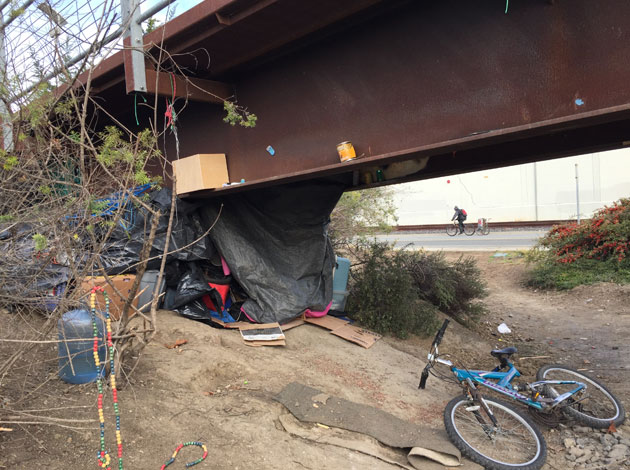
Since it’s the middle of the month, money isn’t as tight for Donna and Louie as it will be in two weeks, when nearly all of Donna’s Social Security check will be spent. So for lunch, they still have some bread and cold cuts for sandwiches. Donna keeps mayonnaise, celery, apples, and pork chops cold in a small blue ice chest. She sends Louie to a nearby Motel 6 every few days for more ice. All he has to do is ask, she says. People are usually very giving when you ask.
The couple met at the Walden House, a rehab facility in San Francisco, a little over a year ago. After treatment, they decided to head east to visit Donna’s son in Utah. They’d barely made it out of town when their car broke down. They haven’t been able to get on their feet since. Donna and Louie tell me this story from outside their encampment, Louie seated on a turned-over milk crate and Donna on a worn pink ottoman. “I don’t know how we got here,” Louie says, crying. “We’re stuck and we’re trying to stay positive,” Donna says.
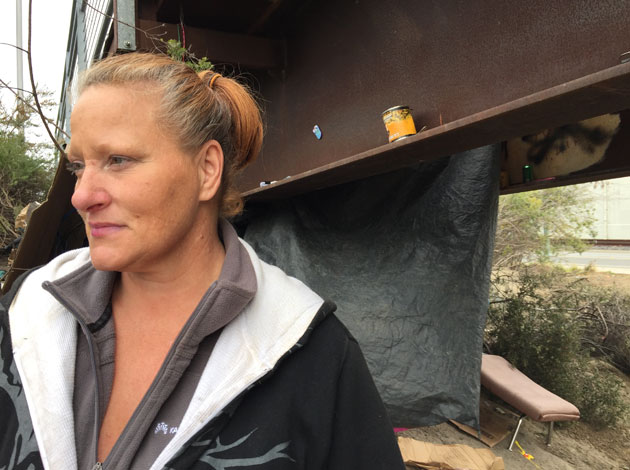
Toward the end of the month, Donna and Louie will eat less meat and more cereal. They’ll mostly skip lunches, and when money thins even more, they’ll both go without breakfast. On the first of the month, Donna heads to the Social Security office to pick up her check, an amount that comes out to an average of about $150 per week. Louie contributes to the larder by working under the table for an Italian restaurant in the nearby town of Alameda. He sweeps, mops, and washes dishes in exchange for a few meals at the end of the night. He’ll get to bring home a to-go box of fries, spaghetti, or Donna’s favorite: salad.
At sunset, Union Point is quiet now that boat owners in the marina have gone for the day. Donna’s two cats, Malachi and Cali, emerge from the bushes and chase each other around camp. A neighbor, Dawn, comes by with some food to share—a bag of nearly thawed chicken nuggets and a plastic container full of tomato sauce for dipping.
Just before dark, Louie heads to the parking lot of an industrial complex across the railroad tracks. He comes back with a wooden pallet and a few moon pies and soda that the warehouse employees leave out from time to time. Since it’s about to rain, Donna wishes she could make soup: celery and carrots and chicken, something they can live off of for a couple of days. But their big soup pot got crushed a few weeks ago when the city cleared out camp. “They’re supposed to store them or something,” Donna says. “But everything got crushed. That was devastating.” Government agencies often do “sweeps” through homeless camps, sometimes destroying or confiscating any property.
Since they have some meat from Louie’s grocery vouchers, they’ll barbecue tonight instead. They’re out of fuel, so Louie stomps the palette into smaller pieces while Donna gathers a few branches from the bushes. She moves slowly in her sandals and black sweatpants, her fading blonde hair slicked back in a bun. On her wrist, she wears a rubber bracelet with the word “Love” on it.
Louie takes all the wood over to the park’s barbecue grills and puts a few pieces under the metal grate. Donna puts two pork chops on the grill. As the smell wafts off the meat, their neighbors Mike and Lucy, who live in tents in the marina parking lot, gather around with a bag of chips and some soda. The temperature drops as the sun sets further. Even though it’s cold, they start up a game of dominoes. Donna boils water for hot cocoa. “It’s a beautiful place,” Donna says. “It’s about the people being here; we’re all the same people.”

